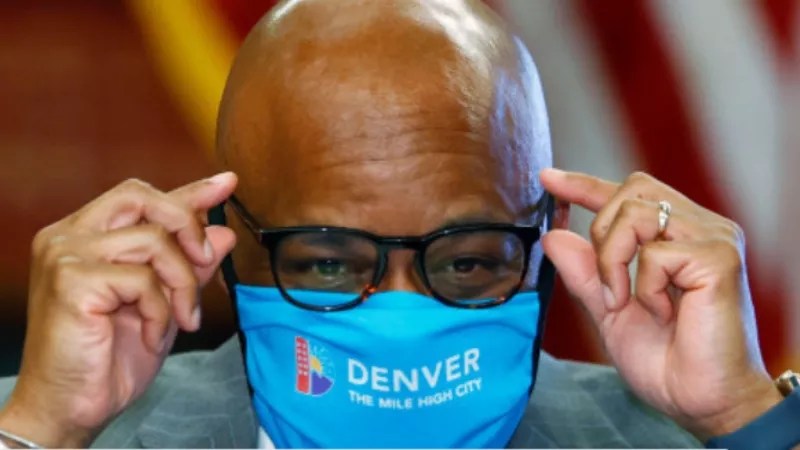

Audio By Carbonatix
To address spiking case counts of COVID-19 in Denver, Mayor Michael Hancock used a November 6 press conference to unveil a “Home by 10” order that will go into effect on Sunday, November 8, and require closure by that time of businesses such as bars, restaurants and clubs.
In making the announcement, Hancock stressed that the mandate, which is set to last for thirty days, isn’t a curfew. Rather, it’s an effort to cut down on gatherings among non-household members – particularly folks between the ages of 18 and 35 who may be asymptomatic and unwittingly transmit the disease to others more likely to suffer serious health impacts.
“I’m not going to mince any words here,” Hancock noted early in his remarks. “When it comes to the spread of the coronavirus, we’re on a very dangerous path.” For instance, he pointed out that hospitalizations for COVID-19 have increased 40 percent in just the past week, leading to an ignominious achievement: “We have the sixth-highest increase of cases and hospitalizations in the entire country.”
After referencing recent meetings with other mayors across the metro area, as well as Dr. Deborah Birx, who visited Denver earlier this week as part of a tour on behalf of the White House coronavirus task force, Hancock explained that the Home by 10 order “will restrict nighttime business hours” for the aforementioned enterprises. Early shutdowns are seen as encouragement for “residents to be in their own homes” by that time, he added. However, Hancock maintained, “This isn’t a public-safety measure. It’s a public-health measure, and it will be enforced like a public-health measure and targeted at the behavior that is contributing to the virus’s spread – namely, younger adults gathering outside their home and spreading it to one another because they’re asymptomatic.”
Because alcohol contributes to a loss of inhibitions that can increase risk-taking, Hancock continued, liquor stores must close by ten, too. And while home food delivery will be allowed after this time, that won’t be the case for potent potables.
Many outdoor activities after 10 p.m. are also okay: dog-walking, going for a run and the like. Other exemptions include critical businesses such as Denver International Airport and medical facilities, employees returning home from work, individuals traveling through Denver, first responders, school systems and more; further details are expected soon. Again, Hancock emphasized that late-night gatherings among members of different households are the focus of the regulations.
The new public-health order also prohibits spectators at high school and college athletic events for a thirty-day period, and the city will halt regional athletic events and close bars that “cannot meet the basic criteria around mingling and food service,” Hancock said. Furthermore, he contended that “more aggressive enforcement will also take place.”
Hancock has made this last contention numerous times since mid-October, and yet there’s been no evidence of a stepped-up crackdown – and subsequent comments by Denver Department of Public Health and Environment Executive Director Bob McDonald suggested that little will change. McDonald seemed pleased that the citations have only been given out in about 1 percent of incidents, and stressed that warnings and education will suffice in all but the most egregious instances.
Thanksgiving falls within the thirty-day window, Hancock acknowledged, and while he said he doesn’t want anyone to think that the holiday is canceled in Denver, he and McDonald each said that they will not be celebrating with anyone outside their own homes this year.
Amid his presentation, McDonald conceded that the current volume of infections puts Denver in line for a new stay-at-home order under the Colorado Department of Public Health and Environment‘s COVID-19 dial system – and he said the city might face such an edict if the epidemiological curve can’t be bent. Yet he suggested that other tactics may still be tried in advance of such a draconian move and encouraged the public to send in their ideas for approaches that might improve the situation without requiring another lockdown.
A subsequent question-and-answer session with journalists prompted McDonald to deny that a stay-at-home order is inevitable, but he called it “a real possibility. This effort is to do everything we can to drive the numbers down. … There’s no silver bullet for this virus.”
For his part, Hancock told the press, “I know there are a lot of questions about terminology: Home by 10 order versus a curfew. But a curfew is not what we’re trying to promote to the public. We’re trying to promote personal responsibility to help us get on top of this spread we’re seeing, particularly with asymptomatic people between the ages of 18 and 35.”